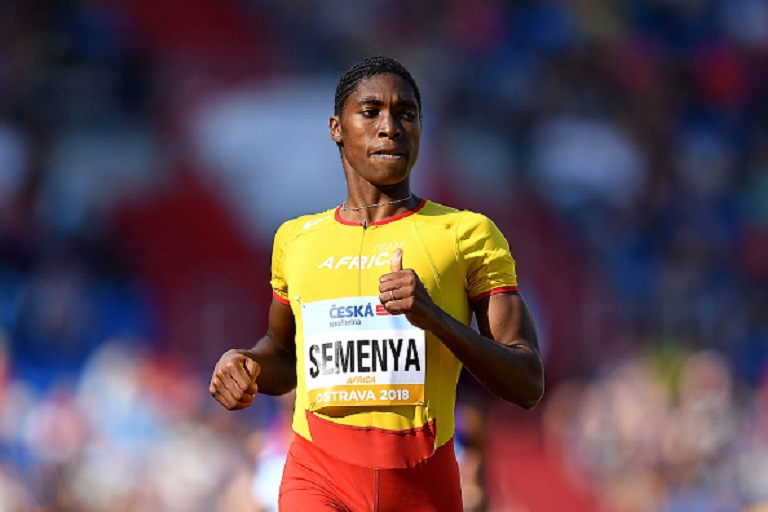Sports Court Set To Rule On Landmark Caster Semenya Testosterone Case
30th April 2019
The Court of Arbitration for Sport in Lausanne, Switzerland heard a week of arguments in the case in February. A panel of three arbitrators is due to deliver its verdict on Wednesday at 12:00 pm (1000 GMT.)

- The world's sports court will decide Wednesday on South African runner Caster Semenya's challenge against rules regulating testosterone in female athletes, a verdict expected to have a profound impact on the future of women's sport
- Semenya, a double Olympic champion, is fighting regulations imposed by the International Association of Athletics Federations (IAAF) that compel "hyperandrogenic" athletes
- In a rare intrusion into the world of sport, the United Nations Human Rights Council adopted a resolution last month branding the IAAF rules "unnecessary, humiliating and harmful."
LAUSANNE, Switzerland-
The world's sports court will decide Wednesday on South African runner Caster
Semenya's challenge against rules regulating testosterone in female athletes, a
verdict expected to have a profound impact on the future of women's sport.
Semenya, a double Olympic champion, is fighting regulations
imposed by the International Association of Athletics Federations (IAAF) that
compel "hyperandrogenic" athletes -- or those with "differences
of sexual development" (DSD) -- to lower their testosterone levels if they
wish to compete as women.
The IAAF says the rules are essential to preserve a level
playing field and ensure that all female athletes can see "a path to
success."
But Semenya's cause has earned widespread support, including
by a global coalition of nations and scientific experts who argue that
testosterone is an arbitrary and unfair measure for determining gender.
READ
ALSO: Girl Power: Kibe, Mukoko Co-Opted To Kenya Rugby Union Board
The Court of Arbitration for Sport in Lausanne, Switzerland
heard a week of arguments in the case in February. A panel of three arbitrators
is due to deliver its verdict on Wednesday at 12:00 pm (1000 GMT.)
Semenya, who has dominated the 800m race over the last
decade, has remained largely silent through the court battle, excluding
statements from her legal team condemning the IAAF's tactics and policies.
But scores of others have vocally rallied behind her.
In a rare intrusion into the world of sport, the United
Nations Human Rights Council adopted a resolution last month branding the IAAF
rules "unnecessary, humiliating and harmful."
With unanimous support from the council's 47 member-states
representing every continent, the resolution marked a stunning rebuke for the
IAAF.
Tennis legend Martina Navratilova is among a long-list of
athletes who have backed Semenya.
But her most fervent support has come from her native South
Africa, where the government has accused the IAAF of seeking to violate women's
bodies and levelled racism charges against the athletics governing body.
Experts have meanwhile argued that barring certain women
from competition due to naturally high testosterone levels would be like
excluding basketball players because they are too tall.
READ
ALSO: Here Are The Astonishing 'Superhuman' G.O.A.T Eliud Kipchoge Numbers
Multiple scientists have noted that achieving excellence in
sport is a combination of training, commitment as well as genetics and that
excluding people from competition over a single genetic factor has no
scientific basis.
- 'Fair competition' -
However, the IAAF is not alone with athletes of the calibre
of World marathon record-holder Paula Radcliffe backing the world body.
"It's a very, very difficult and complex situation and
I don't feel there is an outcome that is perfectly fair to everybody," the
now-retired British runner told AFP last month. But she said she believed the
IAAF "are trying to protect female sport and create fair competition."
The IAAF rules capping testosterone levels in women athletes
at five nanomoles per litre (nmol/L) of blood were instituted in November 2018
but have been suspended pending Wednesday's verdict.
The IAAF, led by British track champion Sebastian Coe, has
maintained that its case is simply about fairness.
DSD athletes with male levels of testosterone "get the
same increases in bone and muscle size and strength and increases in
haemoglobin that a male gets when they go through puberty," the federation
has said.
READ
ALSO: SPL Leaders Gor Out For KCB Revenge, Sofapaka Playing Catch-Up
Ensuring that all women athletes have female levels of
testosterone is therefore necessary "to preserve fair competition in the
female category," it added.
Semenya's testosterone levels are not publicly known, but if
the IAAF rules are approved she is likely not the only athlete who will be
affected.
The two athletes who finished behind her in the Rio Olympics
800m, Francine Niyonsaba of Burundi and Kenya's Margaret Wambui, have also
faced questions about their testosterone levels.
